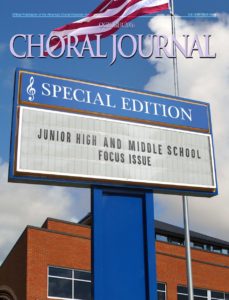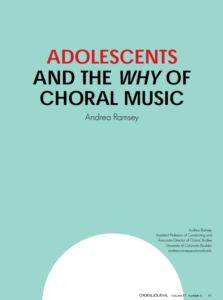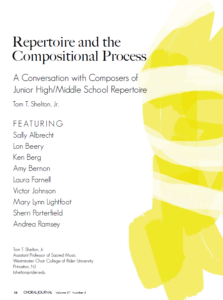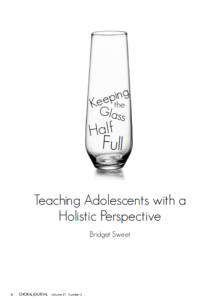The latest issue of Choral Journal is available online! ACDA members can log in with their username and password to view and download the newest version. You can also read our electronic version. Below is a preview of just some of the articles you will find in this issue. If you are not already a member of ACDA, join today to start receiving your monthly Choral Journal!
Keeping the Glass Half Full: Teaching Adolescents with a Holistic Perspective by Bridget Sweet
“When describing the young adolescent, floods of words come to mind. Unpredictable. Emotional. Hilarious. Moody. Angsty. Perhaps, however, the word “individual” is the most appropriate, because each adolescent is unique and progresses through adolescence in his or her own way. It is for all of these reasons–and many more–that educators enjoy working with adolescents so much. This paper comprises two main sections. The first addresses emotion and physical development, which are two key adolescent characteristics commonly encountered in the choral classroom; the second concerns puberty and adolescent voice change.”
Adolescents and the Why of Choral Music by Andrea Ramsey
“We have many articles, books, and videos devoted to the how of teaching the JH/MS singer. These are worthwhile resources that help us better understand the male and female voice changes, guide us in age-appropriate repertoire selection, provide classroom management suggestions, and off er developmentally appropriate teaching strategies for young singers. Yet, perhaps just as important as the how of JH/MS choir is the why of JH/MS choir. Why do young people sing in choir? Why is choir meaningful to adolescents and why do they come back for another semester?”
Repertoire and the Compositional Process: A Conversation with Composers of Junior High/Middle School Repertoire by Tom T. Shelton Jr.
“Selecting repertoire for the middle school choir can be a daunting task. There are a multitude of variables to consider for this specific group including the changing voice, ranges, text, style, variety, voicing…the list goes on and on! Selecting quality repertoire requires finding composers that understand the middle school singer and all of the marvelous challenges inherent in this stage of development. In order to gain more insight into the compositional process for this specific age group, nine composers with a reputation for writing quality literature for developing voices contributed to this article.”
Read these articles and more by clicking here.






Leave a Reply
You must be logged in to post a comment.